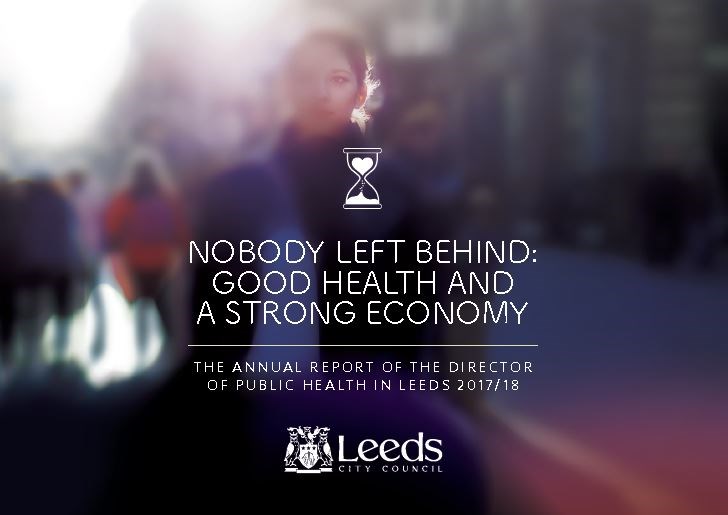
21 Mar 2018
New report warns of challenging times for Leeds health
Prospects for continuing improvements to people’s health in Leeds are under threat according to the latest annual report from Leeds Director of Public Health, Dr Ian Cameron, “Nobody Left Behind: Good Health and A Strong Economy”.
Dr Cameron’s report uses a range of examples to highlight shifts in local and national health trends, including that for the first time in a generation life expectancy no longer increasing. His report covers four key reasons for concern: infant mortality; alcohol-related deaths in women; drug-related deaths in men and suicides in men. His report also looks at a concerning picture around self-harm in women. Dr Cameron makes specific recommendations for these areas but also broader recommendations around gender and health.
Dr Cameron warns that, although Leeds has seen positive recent analysis of broad measures of health for the city, a lack of national investment in preventative health threatens health improvements in Leeds and other parts of the UK made over recent years. He calls for better understanding of reasons for health problems so investment can be targeted as effectively as possible.
Dr Cameron said:
“My report this year focusses on worsening life expectancy for women and a static life expectancy for men. Alcohol mortality in women, self-harm in women, drug misuse in men and suicide in men each play their part. I make recommendations around Best Start and the Inclusive Growth Strategy, with the benefits that come from a strong economy helping cope with some of the impact of austerity on the health of the city.
“However, in depth insight and monitoring of the health of our population helps us get to the root of issues causing the health of men and women to get worse. Reversing these worrying trends needs to be a priority.
“I know these are challenging times and this has an inevitable negative impact on the health of the people in our city. However, partnership working on health and wellbeing has never been stronger. Across the city we are ensuring opportunities are increasingly taken up to improve health outcomes wherever possible – making every contact count and making the best of our community assets.
“The city’s Health and Wellbeing Strategy and Inclusive Growth Strategy set out a clear direction of travel. I have no doubt we have the right priorities. I retain my optimism that, by working together for the city, we can return to improving life expectancies and reducing health inequalities.”
The report points out that life expectancy for women has reduced and for men it is no longer increasing. Infant mortality has decreased by almost a third over the last decade, but latest figures suggest a rise. While Leeds has delivered positive improvements over recent years, the changing trends reflect worsening statistics for cities around the UK.
Alcoholic liver disease, as with levels of drinking, is higher for men than women across all age groups in Leeds. However, while deaths in men have been reducing, deaths in women have been increasing since 2012. In the most deprived parts of the city see the highest rates of alcohol harm and mortality.
Dr Cameron said:
“Our challenge is to understand what lies behind this picture in Leeds. We know there are other towns and cities seeing worse declines, and we have areas where we can be pleased to see good outcomes. But the contrast between these positive areas and the unhappy picture for some of our least well off areas is notable and the decline in female life expectancy and the stagnation of male life expectancy is not down to our major killers of cardiovascular disease, respiratory disease and cancer.”
“Evidence suggests we need to focus our concern on rising deaths in men from drug overdose, more women dying from alcoholic liver disease and two additional trends that, while not statistically significant in terms of mortality, are worrying - more deaths in men from suicide and more women who self-harm.”
“The Leeds Drug and Alcohol Strategy embeds NICE guidelines on the management of alcohol harm. So we are adopting a holistic approach to ensure we both support alcohol recovery through Forward Leeds, the local alcohol and drug service, and we also adopt measures to prevent alcohol harm, identify problems earlier and address the impact alcohol has on the family and the economy. Working with NHS colleagues, licensing authorities and across the city, we’ve made progress. But still have much to do if we are to achieve our vision for Leeds.”
“Mental health for men, women and young people is an increasing concern and consequently there are increases in investment and collaborative working Leeds, with a range of targeted support being offered to reduce suicide and self-harm. Starting early in life is at the heart of a long term Leeds preventative approach, with organisations linking to improve the emotional health of children and young people as part of Future in Mind, using MindMate and MindWell.”
The Director of Public Health’s annual reports can be read and downloaded from www.leeds.gov.uk/dphreport
The report will be presented at the council’s executive board on Wednesday 21st March 2018.
ENDS
For media enquiries please contact:
Phil Morcom
Leeds City Council communications and marketing,
Tel: 0113 378 9180
Email: philip.morcom@leeds.gov.uk
For media enquiries contact:
Leeds City Council Communications team
communicationsteam@leeds.gov.uk